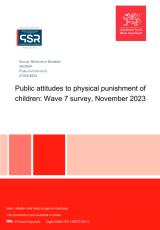This report builds on findings from previous surveys on attitudes towards physical punishment of children, and the Children (Abolition of Defence of Reasonable Punishment) (Wales) Act 2020.
This is not the latest release in the series: Public attitudes to physical punishment of children
Comparison of findings marked with an asterisk (*) are statistically significant, that is, they are likely to reflect a genuine difference over time or between population groups.
Main findings
Attitudes towards smacking
In the latest survey 29% agreed and 55% disagreed that it is sometimes necessary to smack a child. This difference is narrower than existed at the November 2022 survey (27% agreed, 58% disagreed) and March 2022 survey, which reported the peak level of disagreement (23% agreed, 62% disagreed)*.
Those who have caring responsibilities for children aged seven or under, were more likely to disagree that it is sometimes necessary to smack a child (65%) compared with those who do not have caring responsibilities for children aged seven or under (52%)*, similar to findings found in previous waves of the survey.
Opinion remains related to age with those aged over 55 being much more likely to agree that ‘it is sometimes necessary to smack a child’*.
More men agreed with the statement ‘it is sometimes necessary to smack a child’ at 36% compared with 22% of women in the latest survey*. Men’s agreement levels have increased when compared with November 2022 results (31% agreed).
28% of those in social grades ABC1 (largely managerial and professional occupations) and 30% of those in social grades C2DE (largely manual occupations), agreed with the statement ‘it is sometimes necessary to smack a child. This is similar to findings in previous surveys.
Knowledge of current legislation
90% of respondents surveyed in November 2023 correctly thought that the law did not allow parents to smack their children. Only 6% thought the law did allow parents to smack and the remaining 4% reported being unsure. These findings are the same as reported in November 2022.
Awareness was highest amongst women (94% vs 86% for men) and those aged 35+ (92% vs 85% for 16 to 34s)*.
Knowledge of the law on smacking did not vary by social grade.
Awareness of changes to legislation
Levels of ‘unprompted’ awareness of the change in legislation have decreased slightly. In the latest wave of the survey, two-thirds (66%) of people surveyed reported that they were aware of changes to the law in the last year at an unprompted level. This compares to around three quarters (73%) who were aware in November 2022*. The current level matches that recorded in March 2022 (66%).
At an ‘unprompted’ level, carers of children aged seven or under were more likely (70%) to be aware of the change than those without these responsibilities (64%).
At an ‘unprompted’ level, those aged between 16 to 34 were less likely (55%) to be aware of the change in legislation than those aged 35 to 54 (68%) and those aged 55+ (70%)*.
When asked how they thought the law had changed, 90% of those who reported awareness of a change in legislation spontaneously mentioned that there was ‘a [complete] ban on smacking / physical punishment / that it is illegal’.
When prompted, carers of children aged seven or under were more likely (89%) to be aware of the change than those without these responsibilities (81%)*.
Around 1 in 10 (11%) thought that physical punishment that ‘[left] no mark at all’ on the child would still be allowed. Only small proportions thought that higher levels of physical punishment such as something that ‘leaves a temporary reddening on the skin (5%), ‘leaves a bruise for a few days’ (2%) or ‘leaves marks and bruises that last for more than a few days but does not result in permanent physical injury’ (3%) would still be allowed.
In all surveys, TV news / programme was the most frequently cited as the source of awareness of the change in law.
Opinion of changes to legislation
In the latest survey almost 53% were in favour of the removal of the defence of reasonable punishment. This is slightly lower than in November 2022 (56%) and March 2022 (59%), but in advance of findings in 2020 when only 38% reported being in favour.
The change in support for the legislation over time is mostly because of changes in the proportion ‘wanting more information/were unsure of their opinion’, rather than due to a decline in opposition to the change, which has remained relatively consistent.
Those with caring responsibilities for children aged seven and under were more likely to be in favour of the proposed change (65% in favour, 19% against) compared with those who did not have these responsibilities (49% in favour, 25% against)*.
Similar to previous waves of the survey, those aged 16 to 54 years were much more likely to be in favour of rather than against the change in legislation. Among those aged 55+ opinion was more mixed with two-fifths (40%) in support of the change and around a third (34%) being against it*.
Similar to previous waves of the survey, women were much more likely to be in favour of the change (59%) than against it (17%). Whilst more men were in favour of the change than against it, the gap between the two proportions was narrower (48% in favour, 30% against)*. This represents an increase since November 2022 in the proportion of men in favour (45%) and a slight decrease against change (31%).
When asked why respondents were in favour of the change, the most common response was that they ‘[did] not agree with smacking or physical punishment of children’ (45% of those who were for the change). This was also the most frequent response across the previous waves.
Whilst the proportion in favour of the change has changed over recent years, those who remain opposed to the change has been stable (23% in November 2023 compared with 25% November 2020) suggesting there is a group who will struggle to be convinced of the change.
Around a third (35%) of those against change thought that the current situation was ‘needed to control behaviour / discipline child / teach respect / show boundaries’.
Reports

Public attitudes to physical punishment of children: wave 7 survey, November 2023 , file type: PDF, file size: 2 MB
Data
Datasets and interactive tools
Public attitudes to physical punishment of children: wave 7 survey, November 2023 , file type: ODS, file size: 34 KB
Contact
Bethan Gilson
Rydym yn croesawu gohebiaeth yn Gymraeg / We welcome correspondence in Welsh.

